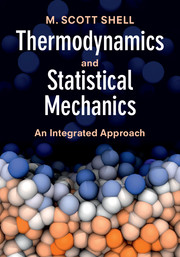Book contents
- Frontmatter
- Contents
- Preface
- Reference tables
- 1 Introduction and guide for this text
- 2 Equilibrium and entropy
- 3 Energy and how the microscopic world works
- 4 Entropy and how the macroscopic world works
- 5 The fundamental equation
- 6 The first law and reversibility
- 7 Legendre transforms and other potentials
- 8 Maxwell relations and measurable properties
- 9 Gases
- 10 Phase equilibrium
- 11 Stability
- 12 Solutions: fundamentals
- 13 Solutions: advanced and special cases
- 14 Solids
- 15 The third law
- 16 The canonical partition function
- 17 Fluctuations
- 18 Statistical mechanics of classical systems
- 19 Other ensembles
- 20 Reaction equilibrium
- 21 Reaction coordinates and rates
- 22 Molecular simulation methods
- Index
- References
13 - Solutions: advanced and special cases
Published online by Cambridge University Press: 05 April 2015
- Frontmatter
- Contents
- Preface
- Reference tables
- 1 Introduction and guide for this text
- 2 Equilibrium and entropy
- 3 Energy and how the microscopic world works
- 4 Entropy and how the macroscopic world works
- 5 The fundamental equation
- 6 The first law and reversibility
- 7 Legendre transforms and other potentials
- 8 Maxwell relations and measurable properties
- 9 Gases
- 10 Phase equilibrium
- 11 Stability
- 12 Solutions: fundamentals
- 13 Solutions: advanced and special cases
- 14 Solids
- 15 The third law
- 16 The canonical partition function
- 17 Fluctuations
- 18 Statistical mechanics of classical systems
- 19 Other ensembles
- 20 Reaction equilibrium
- 21 Reaction coordinates and rates
- 22 Molecular simulation methods
- Index
- References
Summary
In this chapter we extend the fundamental properties of solutions introduced in Chapter 12 to a variety of cases in which a more advanced analysis is required. The uninterested reader may wish to skip these topics. Here we first examine in detail the phenomenology and mathematical description of liquid–vapor equilibrium in multicomponent systems, including nonideal ones. Subsequently, we consider two important classes of systems – polymers and strong electrolytes – for which the ideal solution never provides a reasonable model. We provide the basic models and conceptual underpinnings in these analyses; however, excellent elaborations on these topics can be found in the references noted at the end of the chapter.
Phenomenology of multicomponent vapor–liquid equilibrium
Because multicomponent vapor–liquid equilibrium is so important to the chemical process industries, we elaborate on the ideas initially developed in Chapter 12. Before we consider the mathematics of this problem, let us begin by describing some essential phenomenology. The behavior upon heating a pure liquid at constant pressure P is familiar: its temperature increases until the boiling temperature is reached, at which Pvap(Tb) = P. The liquid vaporizes entirely at Tb and then the temperature subsequently increases again as the vapor is heated.
- Type
- Chapter
- Information
- Thermodynamics and Statistical MechanicsAn Integrated Approach, pp. 246 - 279Publisher: Cambridge University PressPrint publication year: 2015



